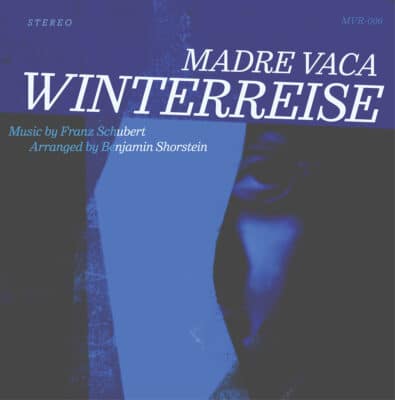Madre Vaca Winterreise
Madre Vaca
Winterreise
Madre Vaca
Seeing the name of Austrian composer Franz Shubert on the cover led me to believe this was some slight twist on classical music by jazz musicians. (and not the kind of music we would cover on these pages). Obviously, I was wrong. As the album unfolded it was stirring modern jazz sprinkled with several free jazz passages – simply a brilliant concoction rendered by the jazz collective Madre Vaca, in this configuration an octet. Yes, it’s great to be surprised. These pieces were originally designed for voice and piano but pianist/drummer Benjamin Shorstein took ten of the pieces from Shubert’s original work and arranged them for the collective comprised of Juan Pollan (tenor saxophone), Steve Strawley (trumpet), Lance Reed (trombone), Jonah Pierre (piano), Jarrett Carter (guitar), Mike Perez (bass), and Milan Algood (percussion).
Wintereisse (Winter Journey) was one of, if not the last of Schubert’s major works. (see below) It’s a song cycle of 24 poems by Wilhelm Muller that told the story of a rejected man who left his beloved’s home to wander away in the middle of a winter night. The opening “Good Night” has a memorable melody and a plodding rhythm likely connoting the young man beginning to make his journey. “The Weathervane” features dynamic and exuberant ensemble passages. “Frozen” becomes a McCoy Tyner-like modal romp driven by Pierre’s piano and Pollan’s tenor. “Loneliness” is not dark but animated, due mostly to Carter’s ringing guitar, and the ensemble head and on-going theme, bolstered by Reed’s trombone.
“The Gray Head,” the most contemplative piece, is filled with dialogues between guitar, piano and bass. “The Crow” kicks into a mid-tempo groove with another explosive tenor spot from Pollan as Pierre comps, leading to expressive statements from Carter and Pierre before reprising the theme. “Last Hope” ventures into free jazz realms involving no horns but point and counterpoint from Pierre and Carter as the rhythm tandem is up to the challenge of several rhythm changes. “The Stormy Morning” surprisingly brings in Latin cha-cha rhythms, the first time that percussionist Algood becomes prominent. Strawley and Reed create the requisite ‘stormy’ havoc before Pierre delivers a shimmering piano solo. “The Sun Dogs” has the original piano-voice format with the vocalist uncredited in the notes, we’re guessing it’s Shorstein’s wife, Rebecca, who has appeared with him on recordings. The energetic “The Hurdy Gurdy Man” closes out this highly enjoyable, oft unpredictable set.
It’s rather amazing to realize that Shubert’s work leaves so much room for interpretation nearly two centuries after it was composed. And, it proves again, that one should not be too quick to judge covers or names. Dig in and listen and you’ll often be rewarded.
- Jim Hynes
About Madre Vaca (for the inquisitive)
As you likely noticed Madre Vaca is both the name of the collective and the record label. They explore a wide variety of music. Previous recordings, Nexus (2018), and Nero (2019) featured a quarter comprised of drummer Shorstein, pianist Pierre, guitarist Carter and either Mike Perez or Thomas Milovac on bass. The label, formed by the musicians, has also released several other recordings including 2019’s A Certain Kind of Darkness which showcases the duo of Shorsteins with Ben on piano and Rebecca singing.
More on Shubert (for the even more inquisitive)
Shubert, who lived to be only 31 (1797-1828) was an Austrian composer of the late Classical and early Romantic eras. Despite his short lifetime, Schubert left behind a vast catalog, including more than 600 secular vocal works seven complete symphonies, sacred music, operas, incidental music and a large body of piano and chamber music. His major works include the Piano Quintet in A major, D. 667 (Trout Quintet), the Symphony No. 8 in B minor, D. 759 (Unfinished Symphony), the ”Great” Symphony No. 9 in C major, D. 944, the three last piano sonatas (D. 958–960), the opera Fierrabras (D. 796), the incidental music to the play Rosamunde (D. 797), and the song cycles Die schöne Müllerin (D. 795) and Winterreise (D. 911).
Discover more from Making A Scene!
Subscribe to get the latest posts sent to your email.















































